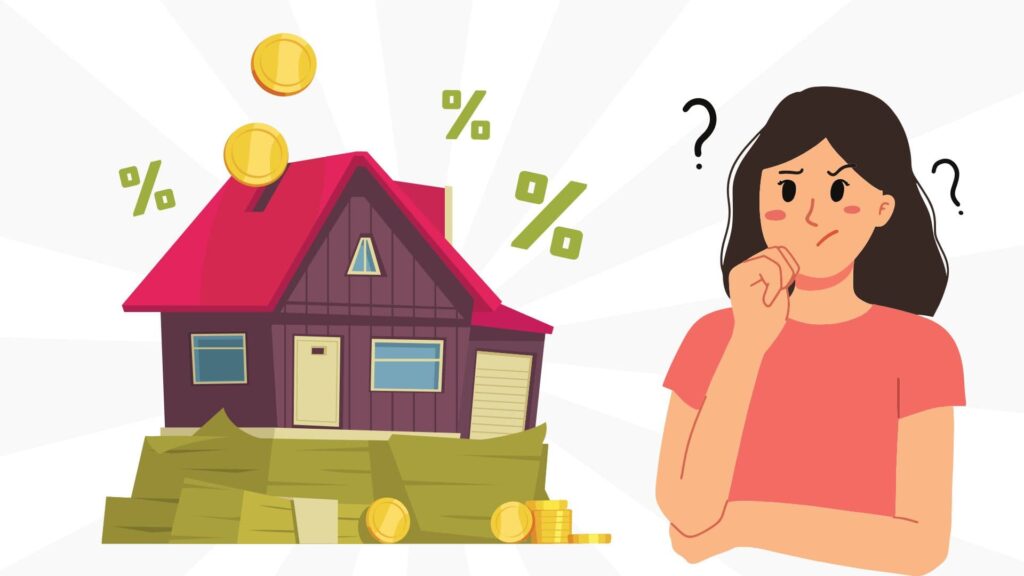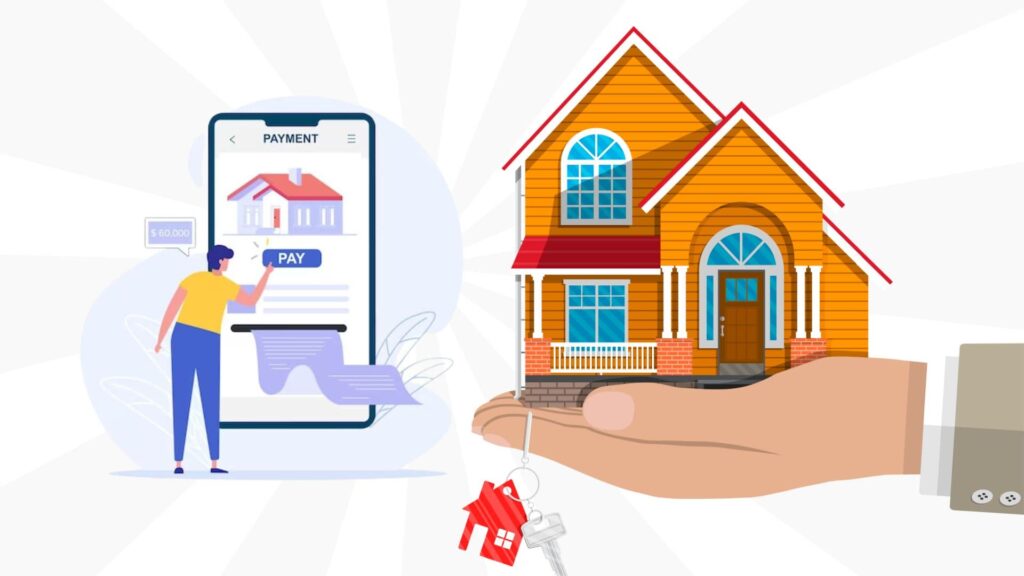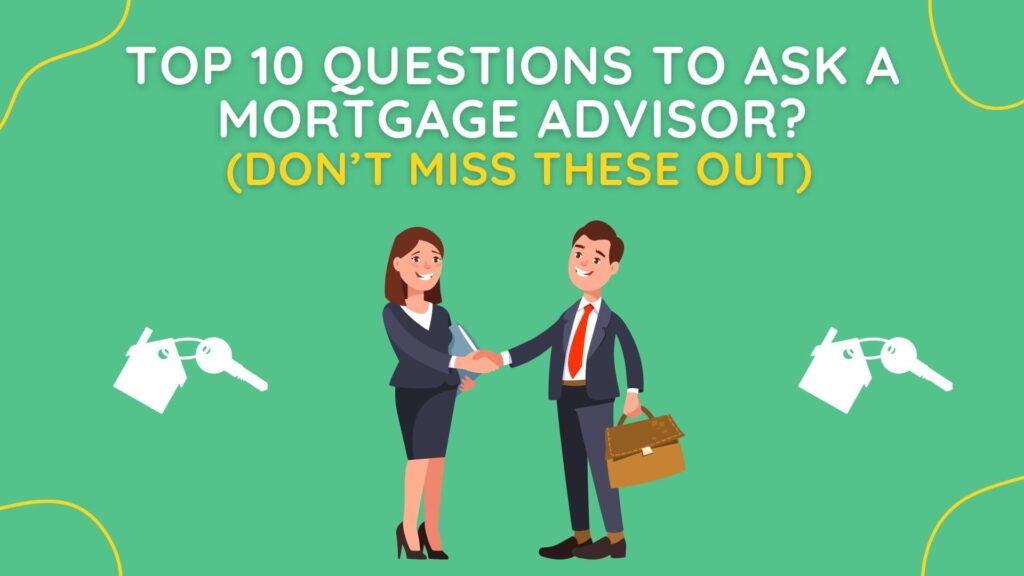
Sammie Ellard-King
I’m Sammie, a money expert and business owner passionate about helping you take control of your wallet. My mission with Up the Gains is to create a safe space to help improve your finances, cut your costs and make you feel good while doing it.
Whether you’re a first-time buyer or looking to move to your next home, let’s be honest: mortgages are a bit of a minefield.
Given that the average monthly mortgage payment is around the £750 mark, which was up 2% last year according to Lloyds Banking Group, you need to ensure you’re getting the best deal available.
That’s why you need to know the best questions to ask a mortgage advisor. Asking the right questions can simplify buying a house and ensure that your mortgage product is right for you.
Your mortgage advisor is the middle man to the lender itself, and whilst they can act like they’re on your side, they also make money from their commissions, so be sure to question them.
What should you be asking your mortgage advisors? Well, here we are to help.
3 Key Takeaways:
-
Know Your Budget: Before you step into the advisor’s office, get your financial ducks in a row. Know your income, outgoings, and credit score to make the most of the consultation.
-
Ask the Right Questions: From interest rates to repayment terms, make sure you ask questions that clarify your mortgage options and obligations. It’s your future home and financial health on the line.
-
Early Engagement is Gold: Don’t wait till you’ve found a property to speak to an advisor. The earlier you consult them, the better your chances of landing a mortgage that suits your needs.
Table of Contents
Boon Brokers are one of the UKs leading online mortgage brokers. They have a 5-star excellent Trustpilot rating with over 543 reviews.
- No mortgage fees
- Whole of market access
- Free online consultations
- Directly authorised by the FCA
- No in person meet ups
Our top 10 questions to ask a mortgage advisor!
1) Are you regulated?
When it comes to questions to ask a mortgage advisor, this has to be up there as one of the most important. In the UK, no one can provide mortgage advice unless they are regulated by the Financial Conduct Authority (FCA).
The other option is that they are allowed to be an agent of a regulated firm. If you feel awkward asking, you can search the FCA register and find out for yourself.
2) Do you cover the whole of the market?
One of the first things that you need to know from your mortgage advisor is the range of products that they have access to.
To be fair, it’s practically impossible to cover the whole market as there are so many lenders and some of these won’t even offer their products via a broker.
However, a good mortgage advisor will have access to a wide range of lenders. They should be able to tell you how many of these there are and, if you really want to know, they should be able to tell you who they are.
The more lenders that a broker has access to, the more chances you have of finding the best deal.

3) How much do you charge?
When looking at questions to ask a mortgage advisor, you will want to know how much they charge. You will find that different advisors work in different ways.
Some will charge you a set fee, which can range anywhere from £500 up to £1,000; some will charge you a percentage of the mortgage. Then other advisors won’t charge you at all; these are usually in-house for a major bank or lender.
Instead, they receive a fee from the lender once your mortgage has been approved.
This type of advisor has an added incentive to find a mortgage product for which you’ll be accepted but also be mindful that they get paid by both the lender and, in some cases you.
4) What sort of deposit do I need?
While it may seem obvious that the bigger your deposit, the better, it is worth asking your mortgage advisor exactly how much you’re likely to need.
How much you will need will depend upon the value of the house that you want to buy as well as the amount that the lender is willing to allow you to borrow.
Generally speaking, you need a deposit of around 10%. However, a good mortgage adviser can find you deals where you don’t need quite as much.
For example, with Help to Buy, you can find mortgages for 5%, which can help lower the burden of saving for a deposit.
5) What type of mortgage do I need?
When you’re looking at buying a house, one of the questions to ask a mortgage advisor needs to be based on the type of mortgage that’s right for you.
If you look for yourself, you’ll find that there are repayment mortgages, interest-only, fixed, variable, trackers, guarantor mortgages and more.
Trying to decide upon the right option certainly is challenging, so this is where the expertise of a mortgage advisor comes in.

Boon Brokers are one of the UKs leading online mortgage brokers. They have a 5-star excellent Trustpilot rating with over 543 reviews.
- No mortgage fees
- Whole of market access
- Free online consultations
- Directly authorised by the FCA
- No in person meet ups
6) What fees do I need to budget for?
One of the questions to ask a mortgage advisor should be about the fees that you need to pay to a lender.
While you’ll need to pay for a property surgery, many lenders will also have fees to arrange and complete your mortgage.
Usually, this isn’t too much and can often be incorporated into the mortgage, but sometimes there is an upfront cost.
Be clear on these and check if they’re refundable should your house purchase fall through for any reason.
It’s also important to understand what happens if you overpay your mortgage or if you decide to sell; what fees are you liable for if you leave the mortgage early?
Lastly, if factor in whether if you pay it off early do you get hit with an early repayment charge.
7) How fast is the process and what do you need from me?
Be sure to ask your mortgage advisor what documents they need from you to get the process going. It is also worth asking how long it will take to complete the process.
A straightforward mortgage application will be faster than a more complex one so ask your advisor how they see your circumstances.
The answer of ‘it depends’ is usually what you’ll hear but ask them to go into detail about the process and how long past applications with this lender have taken.
When working out whether it’s worth buying a house you’ll have other factors at play. Your solicitor will also be working the background doing vital checks and paperwork.
8) How much am I able to borrow?
One of the early questions to ask a mortgage advisor is how much you can actually borrow. Knowing this will determine what house you can actually buy.
The amount that you can borrow is not just about your income. There are affordability checks to be carried out and this is something that your advisor will do with you.
Usually you’d be expecting roughly around 5 times your earnings in the UK and if there’s two of you on the mortgage application then it would be your total income together.

9) Do you have any reviews?
If a mortgage advisor is good, you can be sure that previous customers have sung their praises.
It’s reassuring to know that a mortgage advisor has previously delivered and that there are plenty of prior customers whose faith and trust have been rewarded.
Ask your advisor where their reviews are. They could be on their website, a third-party site, or even in the form of handwritten notes or emails. The truth is that a good advisor will have plenty of reviews, so make sure that you see these.
10) What if it all goes wrong?
An important question to ask a mortgage advisor is what happens if the worst-case scenario comes into play and your application is rejected.
Does this mean that the advisor’s job is simply done with or will they be able to help you?
The reality is that your mortgage advisor should have spent time getting to know you and your circumstances so that the chances of being rejected are almost nonexistent.
However, should the worst happen, be sure that your advisor has a plan and that they won’t just abandon you.
FAQs
What to do before speaking to a mortgage advisor?
Before speaking to a mortgage advisor, get your finances in order. That means pulling together documents like your payslips, bank statements, and a list of your debts and assets.
Doing a credit check on yourself is also a solid move. Having this financial snapshot ready can help you get the most out of your consultation and get you closer to that dream home.
What do you discuss with a mortgage advisor?
With a mortgage advisor, you’ll discuss your financial situation and your property goals. They’ll go through your income, outgoings, and credit history to give you an idea of how much you can borrow.
They’ll also talk about different types of mortgages that could be a good fit for you, such as fixed-rate or tracker, and how long you’ll likely have to repay it.
Think of it as a one-stop-shop for mortgage know-how.
How early should you speak to a mortgage advisor?
The earlier, the better is the rule of thumb when speaking to a mortgage advisor. Ideally, you should consult them before you even start looking for a property.
This will give you a clear understanding of your budget and what you can realistically afford, making your property search more focused and less stressful.
Do mortgage advisors get better rates?
Yes, mortgage advisors often get better rates than you could find on your own. They have access to a wider range of lenders and exclusive deals that aren’t available to the general public.
Plus, they can negotiate on your behalf. So, not only can they save you money, but they can also save you the legwork of trawling through rate comparisons.
How to become a mortgage advisor?
To become a mortgage advisor in the UK, you’ll need to pass a qualification recognised by the Financial Conduct Authority (FCA), such as CeMAP (Certificate in Mortgage Advice and Practice). After that, it’s about gaining experience.
You could start off as a junior advisor or assistant to gain hands-on experience.
With a few years under your belt, you could then look to set up your own practice or climb the ranks in a larger firm.
You can also read our guide on how to become a mortgage advisor in the UK here.
Final Thoughts
Getting to the stage where you’re looking for mortgages is both exciting and stressful. Picking a mortgage broker is a big undertaking as you want someone you can trust, but equally, that will get YOU the best deal.
If this is your first time buying a house, check out our first-time buyers’ guide, which has a timeline of information you’ll need.
Share on social media
Disclaimer: Content on this page is for informational purposes and does not constitute financial advice. Always do your own research before making a financially related decision.



